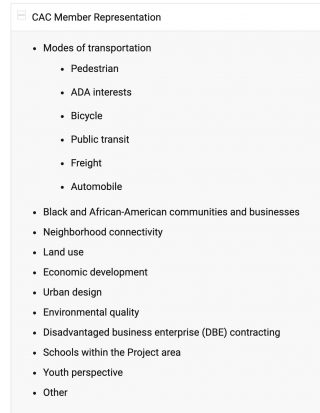Left to their own devices, the Oregon Department of Transportation would already be deep into the design and pre-construction phase of their I-5 Rose Quarter project right now. But because of their own hubris and blind ambition to “deliver” freeway expansion mega-projects at any cost and consequence, ODOT’s boss has forced them to delay.
On January 24th, the Oregon Transportation Commission published a memo (PDF) with 11 actions ODOT must take, “to more fully involve the community in decisions around the project and better evaluate alternatives to help reconnect the Albina community.” One of those actions is to create a community advisory committee. ODOT opened the application period for that committee on Wednesday.
The 20-member committee will be led by a neutral facilitator and is expected to meet up to nine times per year at meetings that will be up to three hours long. ODOT says it wants the committee to “help shape the project design and recommend avenues for equitable engagement with the community.”
It remains to be seen how ODOT will utilize this committee or what (if any) impact it has. As we’ve heard from the group No More Freeways, 90% of the 2,000 comments ODOT received on their federally-required Environmental Assessment opposed the project, yet ODOT still assumes they have a mandate to proceed and the agency wants to avoid doing a more thorough analysis of the project known as an Environmental Impact Statement (a decision on that issue will be made by March 20th). Will ODOT demonstrate an open-mind and willingness to challenge their assumptions and existing proposals based on insights or concerns raised by this committee?
Advertisement
While it’s nice to have another lever of possible influence on this project, I’ll remain skeptical about ODOT’s willingness to take it seriously until I see otherwise. ODOT megaproject committees like this often have the opposite impact of what well-intentioned advocates expect. That is, ODOT ends up using the time and ideas of committee members while using their involvement to move the project along, check a box for the OTC, and create a narrative that everyone involved has locked arms in support of the project.
That’s what they did to push their controversial Columbia River Crossing project. In 2009, a Bicycle Transportation Alliance (now The Street Trust) staffer was a member of a CRC advisory committee. When a key decision was on the table, a disgusted BTA rep had seen enough. “The BTA is done with this public involvement theater,” said Michelle Poyourow, before leaving the committee. “We’re not going to play this game any more.”
Perhaps this time will be different.
Here’s what ODOT says about the committee:
The project team has heard from the community about the importance of continued public engagement. The CAC is one example of how the project will intentionally seek community input, further extend opportunities for the public to engage, and bring community interests and values into the decision-making process. As the project moves forward, ODOT will demonstrate and communicate how the CAC’s input meaningfully informs project decisions.
I hope some of you apply. Learn more about the committee here and find the application here. You can apply through February 18th and the first meeting will be held March 18th.
(ODOT has also been asked by the OTC to consider forming an “Executive Advisory Committee” that would be chaired by OTC Vice Chair Alando Simpson. They have to decide on that by February 15th.)
— Jonathan Maus: (503) 706-8804, @jonathan_maus on Twitter and jonathan@bikeportland.org
— Get our headlines delivered to your inbox.
— Support this independent community media outlet with a one-time contribution or monthly subscription.



